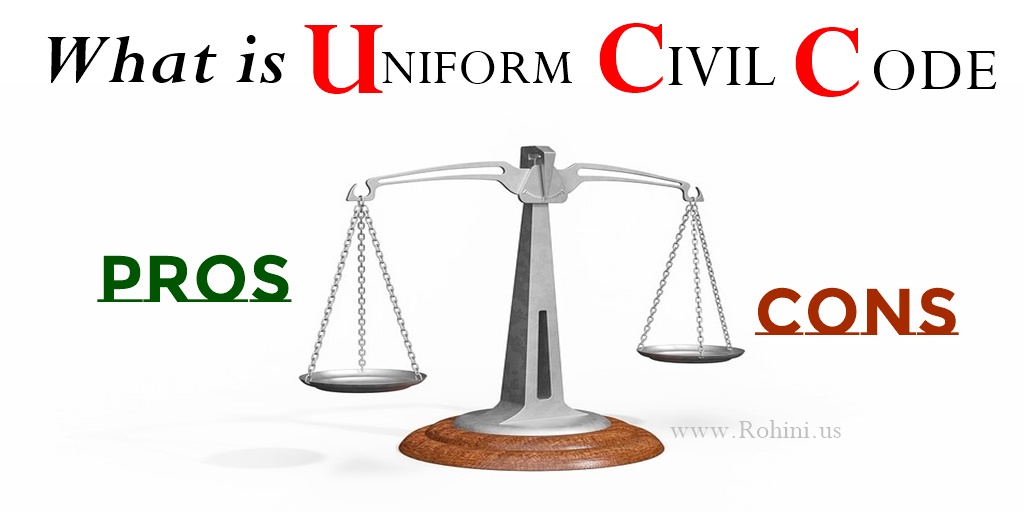There is lot of talk happening about Uniform civil code in social media. Let’s understand in detail about this code and its advantages and disadvantages of implementing this code.
What is Uniform Civil Code?
Uniform Civil Code (UCC) in short means One Country One Rule. With the implementation of UCC, all Indian citizes will share a set of common personal laws, irrespective of their religions. Citizens from all religions will have same set of personal law rules. Currently, for example, there are different personal laws for Hindus and Muslims. Personal law covers property, marriage and divorce, inheritance and succession.
The main purpose of the Uniform Civil Code (UCC) is to replace the existing diverse laws applicable to different communities, which currently lack consistency among them. These laws encompass the Hindu Marriage Act, Hindu Succession Act, Indian Christian Marriages Act, Indian Divorce Act, Parsi Marriage and Divorce Act. It is important to note that certain other laws, such as Sharia (Islamic laws), remain uncodified and rely solely on religious scriptures and interpretations.
It is defined in our Constitution under Article 44 of Directive Principles of State Policy. It states that “State shall endeavour to provide for its citizens a uniform civil code (UCC) throughout the territory of India.” The objective of this endeavour should be to address the discrimination against vulnerable groups and harmonise diverse cultural practices.
But What is Civil Code?
Civil code is can be considered to include all the civil laws of a particular community or nation. Legally, it has been considered to include all personal laws of any religious or ethnic community, which would include not only civil laws but also criminal laws and also any other customs or mores which are exercised by such a community.
Many people believes that the Uniform Civil Code can deny the freedom of religion. Because of this uncertainty, it was included in the Directive Principles of State Policy rather than the chapter on Fundamental Rights in the Constitution. Let’s go deeper into the pros and cons of UCC.
Pros of Uniform Civil Code
– To provide equal status to all citizens irrespective of their religion, class, caste, gender etc.
– To promote gender equality. UCC will bring both men and women at par.
– To To accommodate the aspirations of the young population and to utilise their full potential towards nation building.
– All Indian citizens are equal before the court of law. That is the criminal laws and other civil laws except personal laws are same for all. So, UCC is necessary to promote the national integration.
– To bypass the issue of reform of existing personal laws.
Cons of Uniform Civil Code
– Due to diversity in India it is somewhere tough to come up with a common and uniform set of rules but our Government is trying to come up with common rules.
– Several communities, mainly minority communities perceive Uniform Civil Code as an encroachment on their rights to religious freedom.
– In personal matters, interference of state. As the constitution provides for the right to freedom of religion of one’s choice. But with the codification of uniform rules and it compulsion may reduce the scope of the freedom of religion.
– To bring UCC is a sensitive and tough task but not impossible.
History of Uniform Civil Code
The demand for a uniform civil code was first put forward by women activists in the beginning of the 20th century, with the objective of women’s rights, Equality and secularism. Till Independence in 1947, a few law reforms were passed to improve the condition of women, especially Hindu widows. In 1956, the Indian Parliament passed Hindu Code Bill amidst significant opposition. Though a demand for a uniform civil code was made by Prime Minister Jawaharlal Nehru, his supporters and women activists, they had to finally accept the compromise of it being added to the Directive Principles because of opposition from the Muslim members in the Constituent Assembly of India.
Shah Bano case and UCC
Shah Bano was a 73-year-old woman who sought maintenance from her husband, Muhammad Ahmad Khan. He had divorced her after 40 years of marriage by triple Talaaq (saying “I divorce thee” three times) and denied her regular maintenance; this sort of unilateral divorce was permitted under the Muslim Personal Law. She was initially granted maintenance by the verdict of a local court in 1980. Khan, a lawyer himself, challenged this decision, taking it to the Supreme court, saying that he had fulfilled all his obligations under Islamic law. The Supreme court ruled in her favour in 1985 under the “maintenance of wives, children and parents” provision (Section 125) of the All India Criminal Code, which applied to all citizens irrespective of religion. It further recommended that a uniform civil code be set up. Besides her case, two other Muslim women had previously received maintenance under the Criminal code in 1979 and 1980.
Uniform Civil Code in Goa:
Goa is the only state in India which has a uniform civil code. The Goa Family Law, is the set of civil laws, originally the Portuguese Civil Code, continued to be implemented after its annexation in 1961.
What is the Current status of the Uniform Civil Code
The Uniform Civil Code (UCC) in India has not been implemented yet as of 2023. The idea of enacting a UCC has been a topic of discussion and debate for many years in the country, but it remains a contentious issue.
The UCC aims to replace personal laws based on religious practices and customs with a common set of laws governing various civil matters like marriage, divorce, inheritance, and adoption, among others. The existing personal laws for different religious communities have led to disparities and inconsistencies in the legal system.
However, due to the sensitive nature of the topic and concerns about religious rights and cultural practices, there has been no comprehensive legislation passed to enact the UCC so far. The Indian Constitution grants each religious community the right to follow its own personal laws. As a result, various religious groups have different laws pertaining to family matters.



